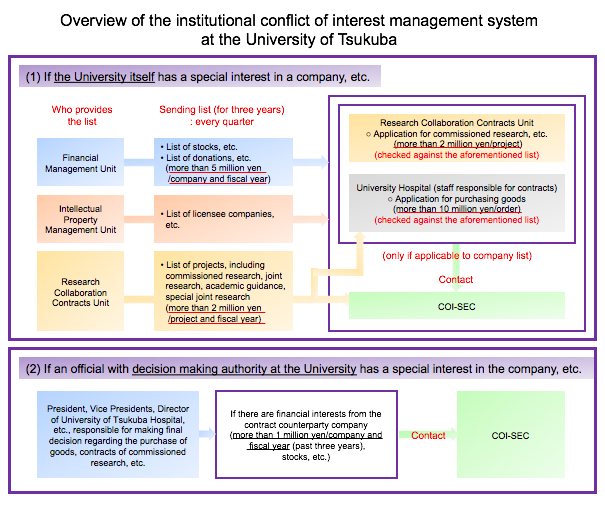Institutional conflicts of interest management system
1. Why an institutional conflicts of interest management system is needed
The Institutional Conflicts of Interest Policy was formulated at that time when the University itself takes part in university-industry collaborative activities as an institution. For example, the University owns stocks and intellectual property such as patents, and receives substantial donations from companies and similar entities. When the University undertakes commissioned research for or other activities with those entities, this creates institutional conflicts of interest for the University. In addition, national universities have been able to invest in Businesses Supporting the Utilization of Specified Research Results since fiscal 2014.
2. Definition of institutional conflicts of interest
Institutional conflicts of interest are defined in the following way in the University of Tsukuba’s rules.
- (1)The University may have an institutional conflict of interest whenever the financial interests from outside the University or the University’s special relationship with a company or other outside entity might affect or reasonably appear to affect the University’s research, education, and other activities.
- (2)The University may have an institutional conflict of interest whenever the financial interests of the University’s official acting within his or her authority on behalf of the University, such as President, Executive Directors, Vice Presidents, Provosts, Director of University Library, Director of University of Tsukuba Hospital, Director of Education Bureau of the Laboratory Schools, or their special relationships with a company or other outside entity might affect or reasonably appear to affect the University’s research, education, and other activities.
In other words, there are two situations when there could be an institutional conflict of interest:
- (1)when the University itself has special interests in a company or other outside entity,
- (2)when the University’s official acting within his or her authority on behalf of the University has special interests in a company or other outside entity.
Situation (1) is when the University itself holds either the rights to intellectual property such as patents or financial instruments such as stocks of a company or other outside entity.
Situation (2) is when the University’s official, such as President, Executive Directors, or Provosts holds the rights to intellectual property such as patents, or financial instruments such as stocks of a company or other outside entity.
This by itself does not constitute an institutional conflict of interest, but if the University enters into a joint-research contract or contract to purchase goods, etc., under the conditions of (1) or (2), this would constitute an actual institutional conflict of interest.
The definition of institutional conflict of interest is “the financial interests from outside the University or the University’s special relationship with a company or other outside entity might affect or reasonably appear to affect the University’s research, education, and other activities” and this could (1) raise a question of objectivity of research or (2) raise a question of the fairness of procurement procedures, etc.
3. Common basic approach toward managing conflicts of interest
The basic approach toward managing conflicts of interest is based on a focus on appearances and prophylactic measures.
It is difficult to prove a causal relationship between an individual or institution having a special interest in an outside entity and biased professional judgements. Therefore, when managing conflicts of interest, the focus should be on prevention, not responding in some way to resulting acts. If it appears to a reasonable person that the special interests could affect fair decision-making, it is important to take steps to respond to that appearance.
This is the same for both individual conflicts of interest and institutional conflicts of interest.
4. Critical elements of managing institutional conflicts of interest
If a conflict of interest results in actual damages, the damage from an institutional conflict of interest is dramatically greater than that from an individual conflict of interest. Therefore, the response to institutional conflicts of interest is normally stricter than that to individual conflicts of interest.
5. Measures against institutional conflicts of interest
The following are measures to the two situations when institutional conflicts of interest arise.
(1) If the University has a special interest in an outside entity such as company
If the University concludes a contract for the purchase of goods, provision of services, commissioned research, etc., which exceeds a certain amount, with a company or similar entity whose intellectual property rights, stocks, or other assets the University holds, the department responsible for the contract, etc., is required to contact COI-SEC. The same applies if the University concludes a contract for the purchase of goods, etc., with a company or similar entity that has made a donation, etc., worth a certain amount or more to the University or is undertaking commissioned research, etc.
(2) If the University official with the authority to make decisions has a special interest in an outside entity such as company
If an official with the authority to make decisions on contracts has a special interest in a company or similar entity that is a counterparty to a contract, the official is required to contact COI-SEC. The official also must submit a report with almost the same format as that of disclosure of individual financial interests. In this way, conflicts of interest with contract counterparties are managed in advance.
○ Response by Conflict of Interest Advisor, etc.
After being contacted, a Conflict of Interest Advisor consults with the Conflicts of Interest Committee (COI Committee) and Advisory Board on Conflicts of Interest (COI Advisory Board) when necessary and decides on a response.
The sharing of information with related departments is indispensable for the system discussed above (1) to function smoothly. Information on intellectual properties the University of Tsukuba owns, donations received, and companies that are counterparties to research agreements is provided to the departments responsible for contracts, and checks are made of contracts with concerned companies and other entities.

















